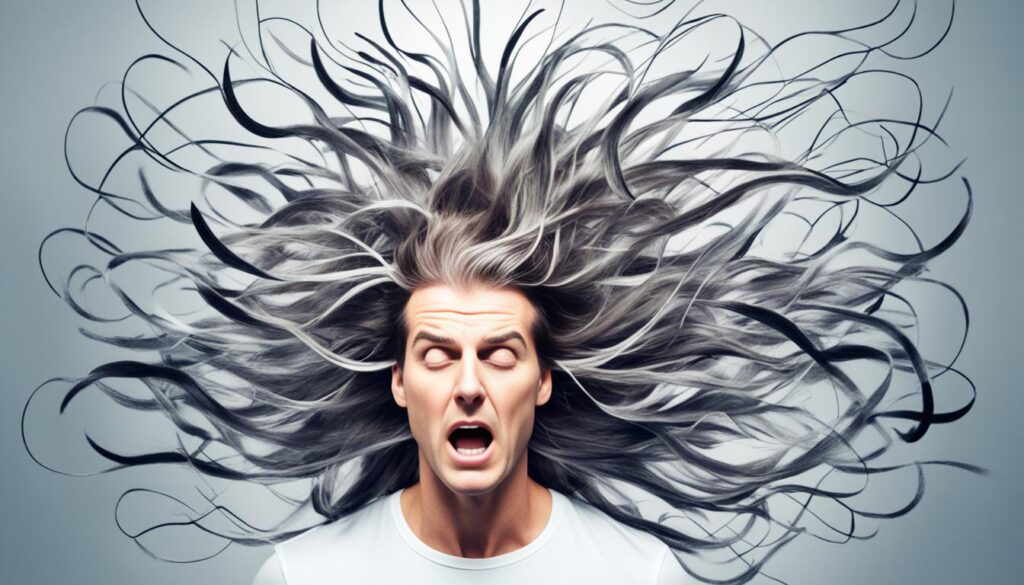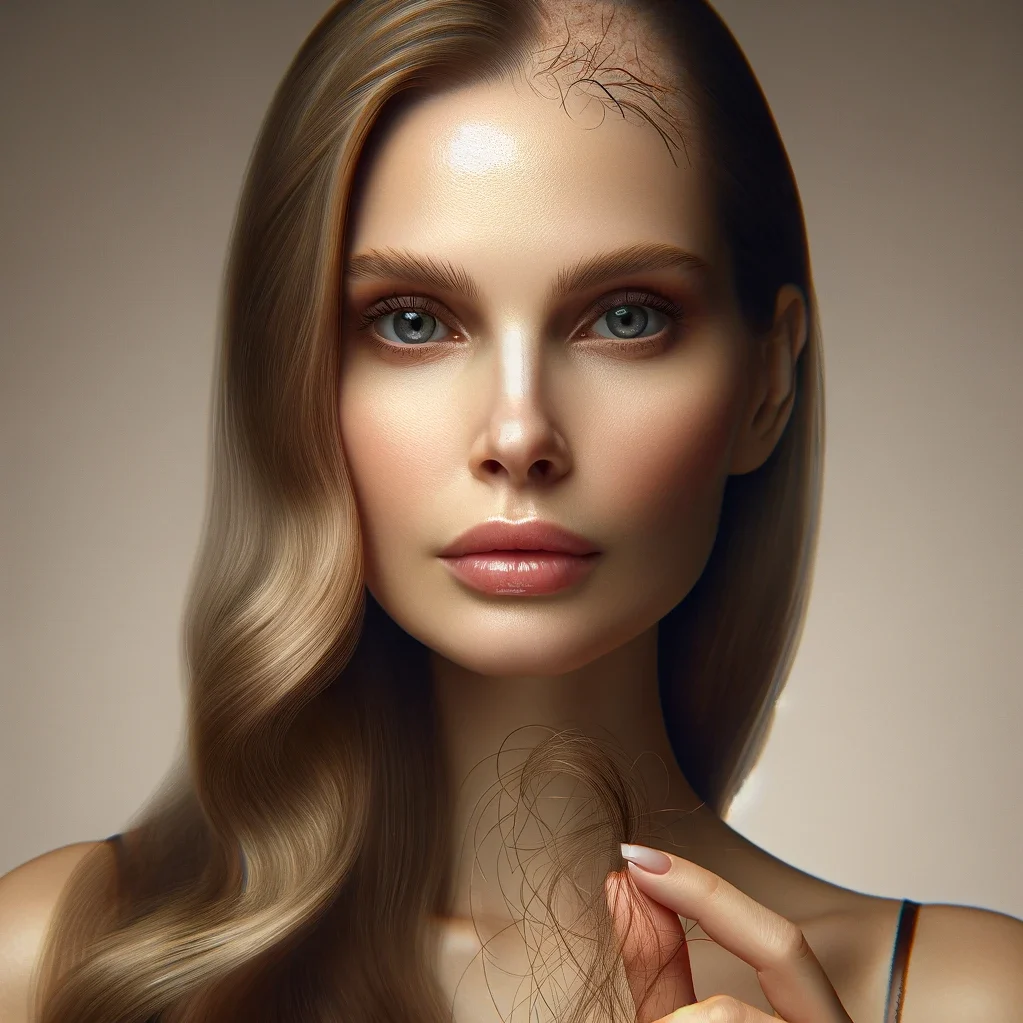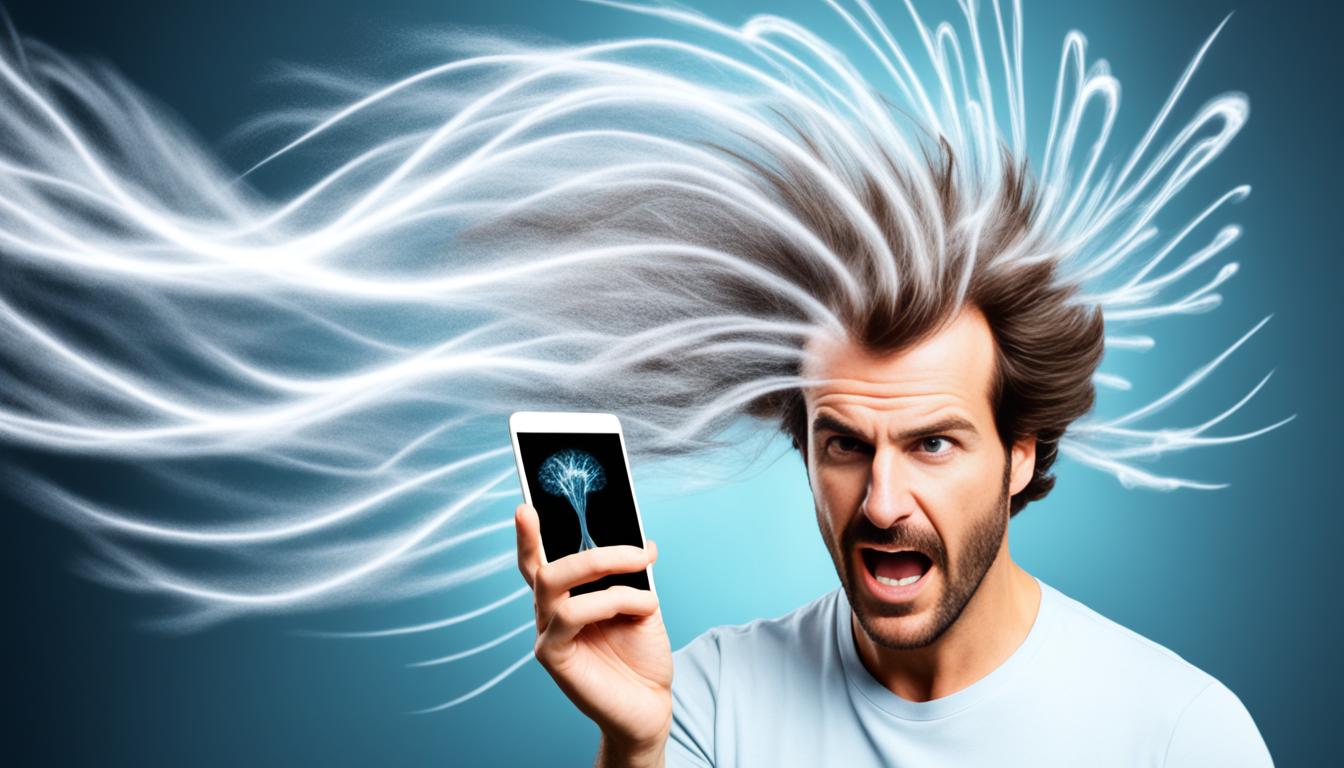Did you know that excessive exposure to mobile phone radiation may have an impact on hair growth? While it’s not widely publicized, emerging research suggests a potential connection between mobile radiation and its effects on hair health.
Although there isn’t a conclusive body of evidence linking mobile phone radiation to significant hair loss, a study published in the Journal of Cosmetology and Trichology found a correlation between prolonged mobile calls held against the ear and hair loss. This raises questions about the potential damage caused by mobile radiation on hair follicles.
Key Takeaways:
- Research indicates a potential link between prolonged mobile phone use and hair loss.
- Mobile radiation can potentially cause DNA breakage, genotoxic effects, and altered hormonal regulation, leading to hair damage.
- Excessive screen time and the stress associated with it can indirectly impact hair health and contribute to hair loss.
- While the evidence linking mobile radiation to hair loss is limited, it’s advisable to reduce screen time and manage stress levels to protect hair health.
- Seeking medical advice and adopting a healthy lifestyle can help address other potential factors contributing to hair loss, such as hormonal imbalances or nutrient deficiencies.
Factors Contributing to Hair Loss and Hair Health
Hair loss can be attributed to various factors that impact hair health. Understanding these factors can help us take proactive steps towards maintaining healthy hair. Let’s explore some of the key contributors to hair loss:
1. Stress and Hair Loss
Stress, both physical and emotional, can have a significant impact on hair health. Prolonged periods of stress can disrupt the hair growth cycle, leading to increased shedding and hair loss. Stress triggers the release of hormones like cortisol, which can disrupt the normal functioning of hair follicles. Therefore, managing stress levels is crucial for maintaining optimal hair health.
2. Hormonal Imbalances and Hair Loss
Hormonal imbalances, particularly an excess or deficiency of certain hormones, can disrupt the hair growth cycle and result in hair loss. For example, an excess of male hormones, known as androgens, can lead to hair thinning and baldness. Hormonal imbalances can occur due to factors such as age, pregnancy, polycystic ovary syndrome (PCOS), and menopause.
3. Thyroid Issues and Hair Loss
Thyroid disorders, such as hypothyroidism and hyperthyroidism, can have a direct impact on hair health. An underactive thyroid (hypothyroidism) can cause hair to become brittle, dry, and prone to breakage. On the other hand, an overactive thyroid (hyperthyroidism) can accelerate the hair growth cycle, leading to increased hair shedding.
4. Malnutrition and Hair Loss
Adequate nutrition is vital for healthy hair growth. Malnutrition, particularly deficiencies in essential nutrients like vitamin B12 and iron, can lead to hair loss. These nutrients play a crucial role in the production of red blood cells, which carry nutrients and oxygen to the hair follicles. Insufficient intake or poor absorption of these nutrients can negatively affect hair health.
5. Auto-Immune Disease and Hair Loss
Auto-immune diseases, such as alopecia areata, can cause hair loss. In these conditions, the immune system mistakenly attacks the hair follicles, leading to hair thinning and bald patches. The exact cause of these auto-immune responses is not fully understood, but genetic and environmental factors are believed to play a role.
6. Allergies and Infections and Hair Loss
Allergies and scalp infections can also contribute to hair loss. Scalp conditions like dandruff, scalp psoriasis, and fungal infections can weaken the hair follicles, leading to hair breakage and loss. Additionally, allergies to certain hair care products or ingredients can cause scalp inflammation and hinder healthy hair growth.
To better understand the factors contributing to hair loss, refer to the table below:
| Factors | Impact on Hair Loss |
|---|---|
| Stress | Disrupts hair growth cycle and leads to increased shedding |
| Hormonal Imbalances | Weaken hair and cause it to fall out |
| Thyroid Issues | Dry, brittle hair or accelerated hair shedding |
| Malnutrition | Deficiencies in essential nutrients impact hair growth |
| Auto-Immune Disease | Immune system attacks hair follicles, causing hair loss |
| Allergies and Infections | Weakens hair follicles and hinders healthy growth |

Investigating the Connection Between Phone Radiation and Hair Loss
While there is no conclusive evidence that phone radiation directly affects hair growth, there have been anecdotal reports of individuals experiencing hair loss possibly resulting from heavy mobile phone usage. However, it is challenging to verify anecdotal evidence.
“I noticed significant hair thinning and loss after using my mobile phone excessively for several months. Though I can’t prove it’s the radiation, I believe there may be a connection.” – Anonymous source
Most research on mobile phone radiation focuses on its potential connection to cancer and other serious diseases rather than hair loss. Some speculate that electromagnetic fields (EMF) emitted by phones may exacerbate existing scalp sensitivities or weaken already fragile hair. However, the evidence linking phone radiation to hair loss is weak, and more research is needed to determine the extent of its effects.
Conclusion
In conclusion, the direct impact of mobile radiation on hair growth remains uncertain, but there are more significant factors contributing to hair loss, such as excessive screen time and the resulting stress. To protect against potential effects of mobile radiation on hair health, we recommend reducing screen time, especially before bed, to improve sleep quality. Additionally, using hair care products fortified with strengthening ingredients like primrose botanical oil and biotin can help protect against hair loss caused by various factors.
It is also crucial to address other potential causes of hair loss, such as hormonal imbalances or nutrient deficiencies, by seeking medical advice and adopting a healthy lifestyle. While the impact of mobile radiation on hair growth may not be significant, taking proactive steps to protect overall hair health is always beneficial.
FAQ
Does mobile radiation affect hair growth?
While the direct impact of mobile radiation on hair growth is uncertain, there is a potential link between excessive screen time and poor hair health. Exposure to cellphone radiation can lead to hair loss through DNA breakage, genotoxic effects, generation of reactive oxygen species (ROS), and altered hormonal regulation. However, significant hair loss is unlikely for the average mobile device user.
What are the factors that contribute to hair loss?
Hair loss can be caused by various factors, including stress, hormonal imbalances, thyroid issues, malnutrition, auto-immune diseases, allergies, and scalp infections. Emotional states and psychological conditions, particularly stress and anxiety, can contribute to hair loss. Hormonal imbalances, especially an excess of male hormones, can weaken hair and cause it to fall out. Thyroid disorders, such as hypothyroidism or hyperthyroidism, can lead to hair loss. Poor nutrition, particularly deficiencies in vitamin B12 and iron, can negatively impact hair health. Auto-immune diseases like alopecia can cause hair loss due to the immune system attacking hair follicles. Lastly, allergies and infections of the scalp can also contribute to hair loss.
Is there a direct link between mobile phone radiation and hair loss?
While there is no conclusive evidence that phone radiation directly affects hair growth, anecdotal reports suggest a possible connection. However, the evidence linking phone radiation to hair loss is weak, and more research is needed to determine the extent of its effects. Most research on mobile phone radiation focuses on its potential connection to cancer and other serious diseases rather than hair loss.
How can I protect my hair from potential mobile radiation effects?
To minimize the potential effects of mobile radiation on hair health, it is recommended to reduce screen time, especially before bed, to improve sleep quality. Additionally, nourishing the hair with appropriate hair care products, such as those fortified with strengthening ingredients like primrose botanical oil and biotin, can help protect against hair loss caused by various factors. It’s also essential to address other potential causes of hair loss, such as hormonal imbalances or nutrient deficiencies, by seeking medical advice and adopting a healthy lifestyle.

